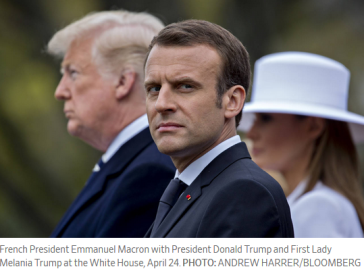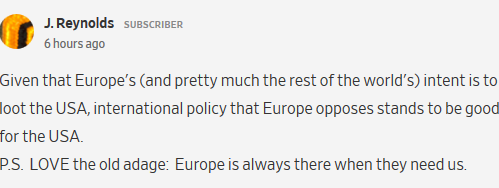No Iran nuclear deal ever existed because Iran never signed anything. Obama’s Iran deal was only a set of “political commitments“ per his State Dept. in 2015.
May 16, 2018, “America’s So-Called Allies,“ Wall St. Journal, Daniel Henninger (print ed., May 17)

“For the Europeans, Obama’s nuclear deal with Iran was always about the money.”
“No one has suggested yet that the Trump withdrawal from Barack Obama’s nuclear-weapons deal will cause the sea level to rise, but we’re almost there. The chain reaction of post-withdrawal disasters cataloged by the global media includes the possibilities that Iran will race now toward building a nuclear weapon, that a war between Iran and Israel could engulf the Middle East, and that America has become “divided” from its allies.
Then it got worse. One week later, the U.S. moved its embassy in Israel to Jerusalem, creating more “friction” with our allies.
America’s unhappy allies are the U.K., France and Germany, cosigners of Mr. Obama’s deal, along with anti-allies Russia and China.
“America’s three closest friends in Europe,” the Washington Post reported, “are near-bursting with anger and exasperation at the United States.” A rule of thumb suggests itself: Might European anger correlate directly with the correctness of U.S. policy, such as this decision to withdraw from the Iran deal and restart the sanctions regime? And when does an ally become something less than that?
Once the media takes ownership of any fixed thought—here that the U.S. withdrawal from the Obama agreement will drive Iran to build a nuclear weapon—no other fact or consideration is permitted to intrude.
The nuclear intentions of Iran’s government are a serious subject at all times. That is why the Trump administration is fixated on the agreement’s so-called sunset provisions.
At the Iranians’ insistence, Mr. Obama and John Kerry agreed that the restriction on Iran’s first-generation centrifuges would end in 2025. After that, and another sunset in 2030 on low-enriched uranium, Iran’s centrifuges could produce material for a bomb in weeks.
France’s president, Emmanuel Macron, seemed to be aware of the problem in his April address to Congress. “As for Iran, our objective is clear: Iran shall never possess any nuclear weapons,” he said. “Not now, not in five years, not in 10 years. Never!”
By the time he returned to France, Mr. Macron had rejoined the chorus that the Obama deal can’t be breached. Ever.
One would like to take seriously Europe’s concerns about Iran’s bomb, but history makes that difficult. In fact, the Iranian nuclear threat is a European red herring, a distraction whose purpose is to take our eyes off other realities.
For the Europeans, the likelihood of Iran going nuclear is a secondary concern. What’s it to them? Iran’s targets are Israel, the Gulf Arabs and the Great Satan. European nations’ active strategic interest in the Middle East ended decades ago with their decision after World War II to elevate domestic welfare and demote the continent’s military significance.
Europe became an economic power whose interests are solely commercial. Despite the Middle East’s continued strategic importance, Europe’s view of it is entirely bloodless—a region that is merely a dependable trading partner for Europe’s biggest companies.
When in 2013 Mr. Obama raised the possibility of a deal that would lift the Iranian sanctions regime, the Europeans were all in. Whatever Mr. Obama’s nuclear dreams,the deal’s primary attraction for Europe—and Iran—was always overwhelmingly about money.
Recall that in 2012, the European Union’s growth rate had fallen below zero. Europe was also dealing with an existential threat in the Greek debt crisis, which required several multibillion-euro bailouts.
Once the Obama nuclear deal became final in 2015, Europe’s deal makers were inside Iran like a shot. European Union members, led by Germany, quickly became the mullahs’ main trading partners.
Bear in mind that the agreement’s flaws were recognized at the time, such as ignoring Iran’s messianic and imperial projects.
Just days after the agreement was reached in July 2015, the head of Iran’s Quds Force, Qasem Soleimani, was in Moscow, no doubt discussing the Russo-Iranian alliance in Syria, which quickly drove torrents of refugees into Europe. In other words, the Obama-Kerry deal with Iran helped to destabilize Europe’s politics. The European publics should demand a new deal.
The U.S. Treasury recently identified how Iran’s central bank has been laundering money through Iranian companies to acquire dollars in other Middle Eastern countries and then finance its Quds Force in Syria and other regional proxies.
Which is to say, Iran’s European trading partners are underwriting, in part, the Iran-driven Middle Eastern mess—from Syria and Lebanon, through Iraq to Yemen. The U.S., as always, is supposed to clean it up. Americans don’t have the luxury, literally, of being AWOL from the world’s most difficult problems.
As someone might say, this is a bad deal.
On Wednesday, The Wall Street Journal reported that French, German and Danish companies—such as Total, Wintershall and Maersk Tankers—are winding down their business ties with Iran in response to the U.S. sanctions. That should start closing the spigot on Iran’s revenue sources. The world will be a better place.
We are going back to the status quo before the Obama Iran deal—back to reality.”
…………………….
Among comments
………………………
.........

Added: All signers of Obama’s very personal Iran pledge were obligated to defend Iran were it ever attacked. For example, if Israel for its own preservation were forced to attack Iran, the US, France, Germany, UK, Russia, and China would all have to join Iran against Israel:
7/30/2015, “U.S. to defend Iran against Israel?” American Thinker, Dan Calic
“Section D, titled “Nuclear Safeguards and Security,” item #10 reads as follows:
“E3/EU+3…are prepared to cooperate with Iran…through training and workshops to strengthen Iran’s ability to protect against, and respond to nuclear security threats, including sabotage, as well as to enable effective and sustainable nuclear security and physical protection systems.”
I may not be the brightest apple in the barrel, but as I understand it, this commits the U.S. and the other signatories (Russia, China, France, Britain, and Germany) to help defend Iran if any group, organization, or country engage in a cyber attack, or military action against it.“…
In addition, there were two secret “side deals”:
“We now know there are two secret deals included in the nuclear agreement with Iran. The two “side deals” are between the IAEA and Iran. When Obama transmitted the text of the Iran deal to Congress, these were noticeably absent.
Understandably many members of Congress have expressed concern, to the point of shock about being kept out of the loop on these private agreements. However, what’s worse is that during questioning, when asked about them, Secretary of State John Kerry confirmed that the details will not be revealed. Even more disturbing is his suggestion that no member of the U.S. government is privy to the details….
This means we are to trust a country whose leadership routinely promotes the death of America and the death of Israel.”…
..................

No comments:
Post a Comment